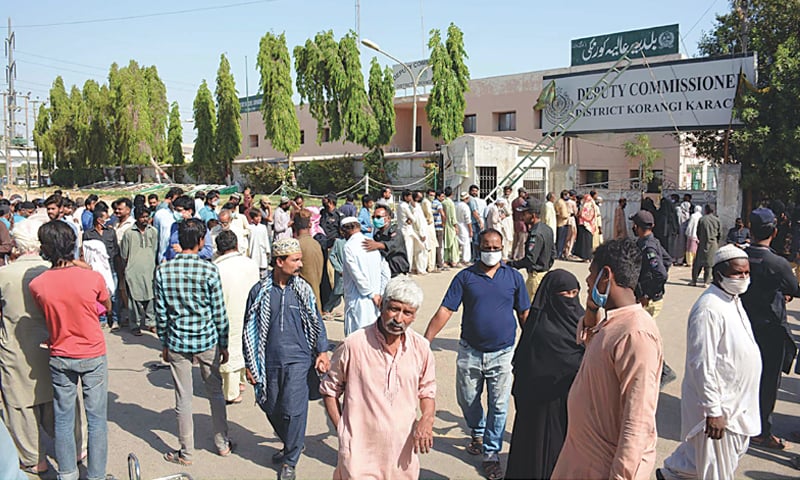Coronavirus is spreading at a rapid pace not just worldwide, but also in Pakistan. The only way of tackling its spread is through social distancing, and by adopting proper hygiene.
While they may sound simple and convenient for most of us, it is simply a luxury that most Pakistanis cannot afford. Take the French Colony slum in Islamabad, social distancing is impossible as there is hardly any space for residents to move about on the narrow streets or even within their homes.
NPR interviewed a local resident of the slums who gave a first-hand account of the daily struggles. Peter Joseph, a 39-year-old painter, says he does his best to keep his family safe during the pandemic. Mask and hand sanitizers are in very short supply and expensive for him to afford for his large extended family.
“Even if somebody falls ill I would still have to keep them in the same room, because I have only one room,” Joseph told NPR last week as a gaggle of children crowded nearby onto a sidewalk, playing marbles while another child flew a kite.
Even transportation is a risk as mostly working-class Pakistanis cram into vehicles to get about. On a typical day in Islamabad, its not unusual to see more than a dozen men crammed into the back of a pickup truck – and about five more sat on the roof of the vehicle. Wealthier motorists can’t help but look in horror from their cars.
Urban planning activist and founder as well as director of the Karachi Urban Lab, Professor Nausheen H. Anwar believes that the city slum dwellers may emerge as one of the most vulnerable populations to the disease.
“I honestly believe that urban Pakistan is at the front line of the COVID-19 crisis. Think about countries badly affected by the pandemic, like Italy or Spain, where there is almost universal access to clean water, sanitation. What we’ve seen is that the virus has spread at an absolutely unimaginable pace. So what are we looking at when we think of urban Pakistan?”
Professor Nausheen is referring to places like Lyari where about two-thirds of its population of at least 16 million people live in slums. Many residents of those areas do not have running water. They purchase water from tankers. It is expensive which is why it is used sparingly, often just for cooking and regular hand washing is an unimaginable luxury.
Anwar has described Pakistan’s urban slums as black spots. They often lacked running water, sewage systems and reliable electrical power and officials don’t keep data on these communities, making it very difficult to formulate good policies – including how to keep residents safe during a pandemic.
So even as the pandemic looms across Pakistan, the crowding continues. On March 26, a video uploaded on Twitter by human rights activist in the slum, Sameer Mandhro showed a Lyari street after provincial officials announced a shutdown just days earlier.
Crowds crammed on a narrow street, brushing against each other, buying food. They have nowhere else to go, said resident Pir Bux, whom NPR contacted by phone – no room inside their homes, no open spaces elsewhere.
Complet lockdown, Lyari, Karachi. pic.twitter.com/PdLoagwItt
— Sameer Mandhro (@smendhro) March 26, 2020
“Everybody is on the streets, kids, young people, the elderly. If the police ask them to leave – they just converge somewhere else,” said Bux.
His neighbor is Mohammad Abid, a daily laborer who shares a five-room apartment with 25 people: his brothers, their wives and children. Abid says if the coronavirus rips through here, it would be worse than Italy. He says:
“There won’t be enough people left to collect the bodies.”
This is probably the biggest issue faced by our government and how it handles the slums during this global pandemic will determine how we can stop the spread of the COVID-19.
What do you think? How should this situation and condition be handled? Share your thoughts in the comments below.
via NPR









I am a foreigner and have been living in Islamabad for the past 7-1/2 years. I have observed that by nature Pakistanis are very sociable and that is part of their culture. They usually have large families.
Corona virus is a real threat to them. They will have to wear face masks and follow the 1 metre distance rule or the consequences will be devastating. There is space for them to do this.